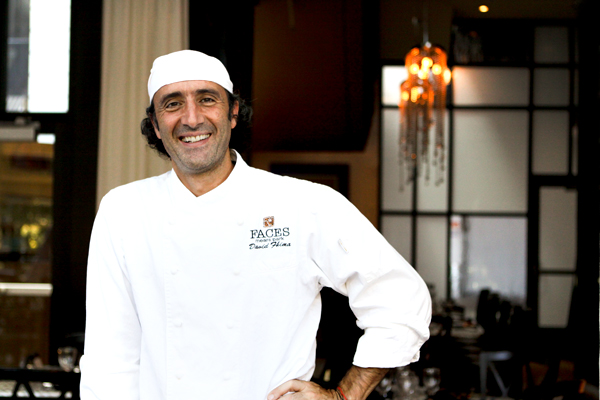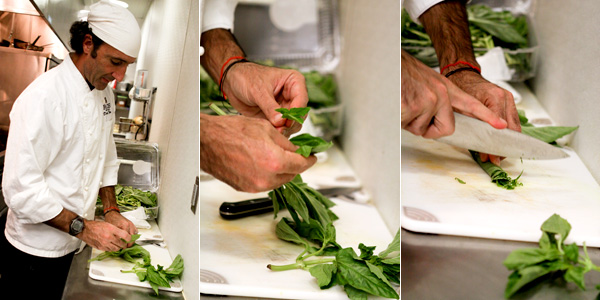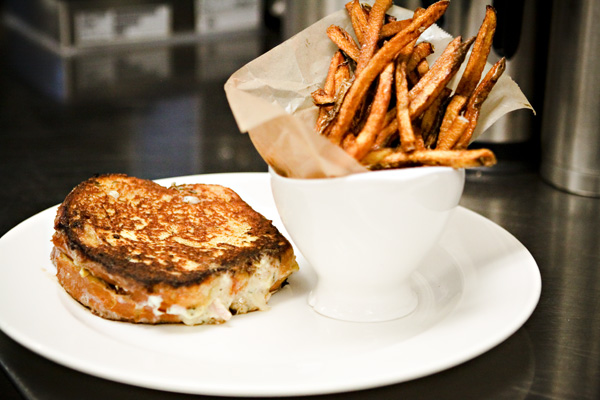
This is part of an occasional series of interviews with parents involved in the local food scene — a peek into the family kitchen, where the kids need to eat dinner no matter what Mom or Dad does for a day job.
Chef David Fhima wants you to stop using the word “healthy.” Just stop. Especially when talking to your kids.
“At home we don’t label food except by ‘It tastes good’ or ‘It doesn’t taste good.’ My kids know an organic tomato tastes good,” he says.
The co-owner and chef at Faces Mears Park and executive chef at Lifetime Fitness’s LifeCafe recently helped Wayzata High School revamp its pizza program. The school had been offering students Domino’s pizza twice a week, but wanted to switch to something “healthier.”
“I told them, ‘I don’t know about healthier, but my pizza is made from unbleached flour, the marinara is organic, the cheese is organic, and it tastes better,’” Fhima remembers. “And they said, ‘Yes, but is it healthier?’”
So, without using that particular taboo word, they tried it out on the students. No surprise, the kids loved it. (Really, let’s give even teenagers some credit here.) It turns out, Fhima says, his pizza had 40 percent less fat and 30 percent fewer calories than Domino’s, but, “We didn’t go into it saying, ‘Let’s make a low-fat, low-cal pizza.’ We said, ‘Let’s make a good pizza.’”
And that’s the way Fhima says he is teaching his four kids, ages 8–19, to look at food, as well.

At home, that means buying organic when it comes to vegetables with thin, porous, or edible skins; root vegetables; and greens. It means grass-fed meats and moderation in everything, including moderation.
“We do have hamburgers. And we put cheese on them and we put mayo on them. Good mayo. We don’t put two tablespoons on, though; we put one teaspoon on.”
Soda is out of the question, but fresh-squeezed orange juice with club soda is a fine substitute. “The kids love it! You put this and a pop in front of them and they will choose the juice any time.”
It also means accepting some parental responsibility. “Parents have to stop being lazy,” Fhima says. “You can’t ever give your kids permission not to eat something. They have to try it.” He remembers one of his mother’s rules: If you try something and say you don’t like it, you’re sure to see it again next week. If you try it and keep your mouth shut, she’ll give you a pass. “All of us had foods we didn’t like that we ate,” he says. “I realized the wisdom of all that was giving our palates a chance.”
A native of Morocco, Fhima grew up in a home where “food was more important than religion…. I would come home from school and my mom wouldn’t ask me, ‘What homework do you have?’ She would say, ‘Put down your backpack and start cleaning fava beans.’ She would tell me to count the stones and if I counted them accurately, I could have a privilege.”
Food in the Fhima home was more than crude fuel; it was almost medicinal. The night before a big test, on the table would be a beef stew with lots of za’atar, believed to make you tranquil and alert without keeping you up all night. After gym or sports, dinner would include turmeric, thought to heal bones and help metabolism.
Before we put the word “healthy” back in our vocabularies, Fhima says, we’ve got to redefine it.

“Great flavor from a good natural source, that in itself is good for you,” he says. “The body knows good food. It craves that type of food. Then it feels satisfied and diminishes cravings and you don’t overeat. Unfortunately we have reversed the approach: How many calories should we eat versus how good food should I eat.”
Next, Fhima says, we’ve got to get kids involved in making the food. “In the kitchen I let the kids taste it and ask, ‘What do you think is missing?’ Do you know how many meals there have been where the kids have said, ‘This is missing’ and I knew it wasn’t missing but I put it there anyway? Do you know how many bad meals I had?” The sacrifices we make for our children.
Traditional childhood treats like chicken nuggets, French fries, and pizza aren’t off-limits in the Fhima home, but they are homemade. “So we have pizza night — do you know how easy it is to make a pizza? — and I give them flour, water, and yeast and they learn that if they play with it just enough the dough rises. Play with it too much, it doesn’t rise.”
And if you’re going to be having a treat like French fries at dinner, you can try Fhima’s trick to fool kids’ — and adults’– appetites: Start out with tomato soup and you probably won’t reach for a second helping.
Finally, if you want kids to eat vegetables, for heaven’s sake cook them well. “What we wind up doing is force-feeding our kids vegetables, but we are boiling them instead of sauteing them! My mom used to say the only thing you should boil is water. I can make you a Brussels sprout that any kid will eat. I will saute it in a little butter, with a little raw sugar. There is nothing wrong with butter, as long as it is organic butter from a good source.”
That’s healthier, he says, because it’s just plain better.

Wow, this is totally great, the man is right on! Come to think of it, I think my mom did steam/boil veggies, but not too long, and then she put some sour cream, butter and fresh lemon juice on them, which makes any vegetable taste great! thanks for this..
This is ridiculous. Fhima may say he uses organic product but don’t be so sure. As a former employee I can honestly say that David often labels items as “organic, free range, heirloom” or other hot buzz words. When in reality he is using everyday ingredients. Most things this guys says are straight up lies. He just wants the publicity.